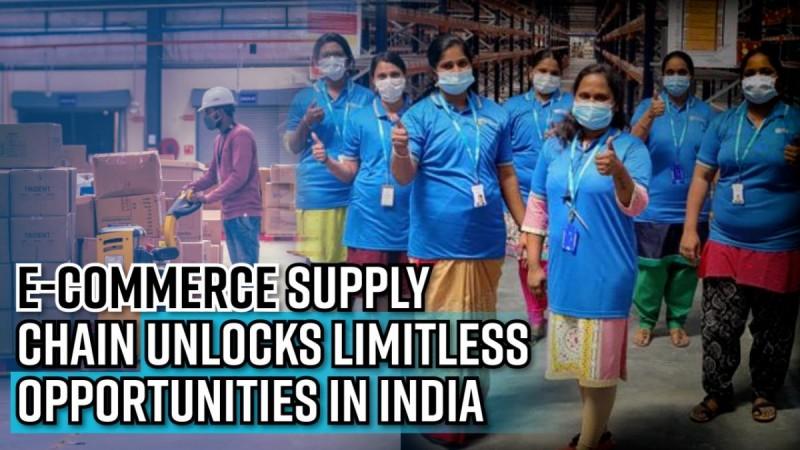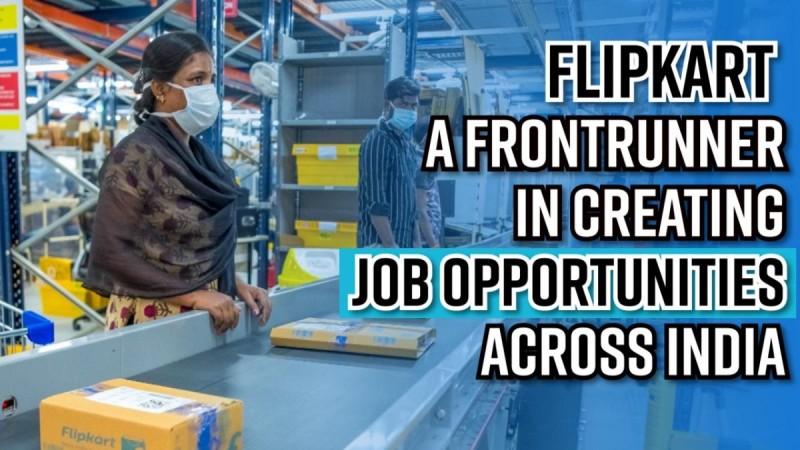
Never before in the history of Indian commerce have millions of offerings been available to customers at the click of a button and delivered at their doorstep seamlessly. From the jungles of Gir to 5,000 feet above sea level in Siliguri, West Bengal and near the Indo-Pak border in Gujarat to the interiors of North-East, e-commerce has been bringing customer delight across the nook and corner of the country.
This has been enabled by the rise of modern supply chains which forms the backbone of e-commerce, helping it emerge as the new engine of growth for India and Bharat. This is in turn creating numerous employment and entrepreneurship opportunities for youth across the country through supply chain facilities and allied services.
This becomes particularly important as the supply chain offers a myriad of opportunities for people from diverse educational backgrounds - from Matriculation certificates to Master in Robotics - enabling large-scale participation of youth from metros as well as tier 2, 3 cities, mofussil towns and villages.
Flipkart leads by example; becomes an ecosystem enabler
Today, millions of people are employed by e-commerce supply chains across the country in roles ranging from delivery executives to packers, pickers, sorters and data entry operators among many.
Flipkart, as India's homegrown e-commerce marketplace, has been at the forefront of offering a seamless e-commerce experience through its state-of-the-art supply chain, eKart, while creating employment opportunities for the youth.
Through a chain of large warehouses or fulfillment centers, sortation centers, and smaller delivery hubs, Flipkart employs lakhs of people directly and indirectly. A visit to our Haringhata fulfillment center in West Bengal, which is one of India's largest and most modern facilities, offers an insight into the impact of e-commerce operations.

At 110 acres, the fulfillment center is located 50 km from Kolkata, with 5 million cubic feet of storage, and supports over 20,000 sellers from West Bengal and North East and lakhs of sellers from across the country. This facility alone has the capacity to generate 11,000 direct employment opportunities in the state.
The expansion of the supply chain in smaller cities is also enabling the participation of people from different walks of life. From women to people with disabilities and transpersons to ex-service personnel (armed forces), the e-commerce supply chain is offering a window of opportunity for people to work with dignity, become independent, and start a new chapter in their professional lives.
At Flipkart, we have established a very diverse and inclusive workforce where thousands of women, PWDs, transpersons and ex-service personnel work together to bring customer delight. However, as the adage goes "Rome wasn't built in a day", this has been an outcome of continuous and evolving efforts from the ecosystem and we are actively working towards further improving it.
We initiated programs such as Vividhta or Diversity for onboarding women, Ekartians with Disabilities (eDAB) for people with disabilities, Indradhanush for transpersons and Flipkart March for ex-service personnel, which today has become a shining example for the industry.
However, supply chain management requires specialized skills which are essential to offer a seamless e-commerce experience to customers and enhance the growth potential of the youth. On its part, Flipkart introduced its Supply Chain Operations Academy to provide skill-building training across the country. Through a mix of online and on-the-job training, this initiative intends to help create a pool of skilled supply chain operations talent and provide relevant industry training and knowledge. It will further help bridge the skill gap and create employment opportunities in the expanding supply chain industry in the country.
And while we have been influencing the lives of people working dedicatedly with our supply chain, as a committed corporate citizen, we have also been creating meaningful opportunities for ecosystem partners such as kiranas, technicians and freelance service providers for delivery and installation services.
Flipkart's kirana program today has more than 2 lakh mom-and-pop stores across the country associated with the program and delivers over 30% of the millions of shipments delivered per month. With a vision of enabling ecosystem partners who have time, space and are willing to earn an additional source of income, the kirana program has become a huge enabler for the oldest form of retail in India. The program, particularly, came as a huge support to the kiranas during the peak COVID period where the delivery incomes helped them sustain themselves and their families.
Taking this vision ahead, we rolled out our TrueFlex program earlier this year which enables anyone to become a Flipkart Wishmaster and bring customer delight by delivering shipments. In less than a year of its rollout, the program has already onboarded over 90,000 partners or agents who are utilising the flexibility of the program to deliver based on their availability and comfort.
This is the true essence of being an ecosystem enabler where we are able to create a shared value for everyone and create prosperity for lakhs and lakhs of people joining hands with Flipkart year-on-year.
Disclaimer: This is a guest post by Hemant Badri, Senior Vice-President and Head of Supply Chain, at Flipkart. Previously, he was the Vice President of Worldwide Planning, Analytics, Customer Experience and Europe Operational Planning at Unilever.













